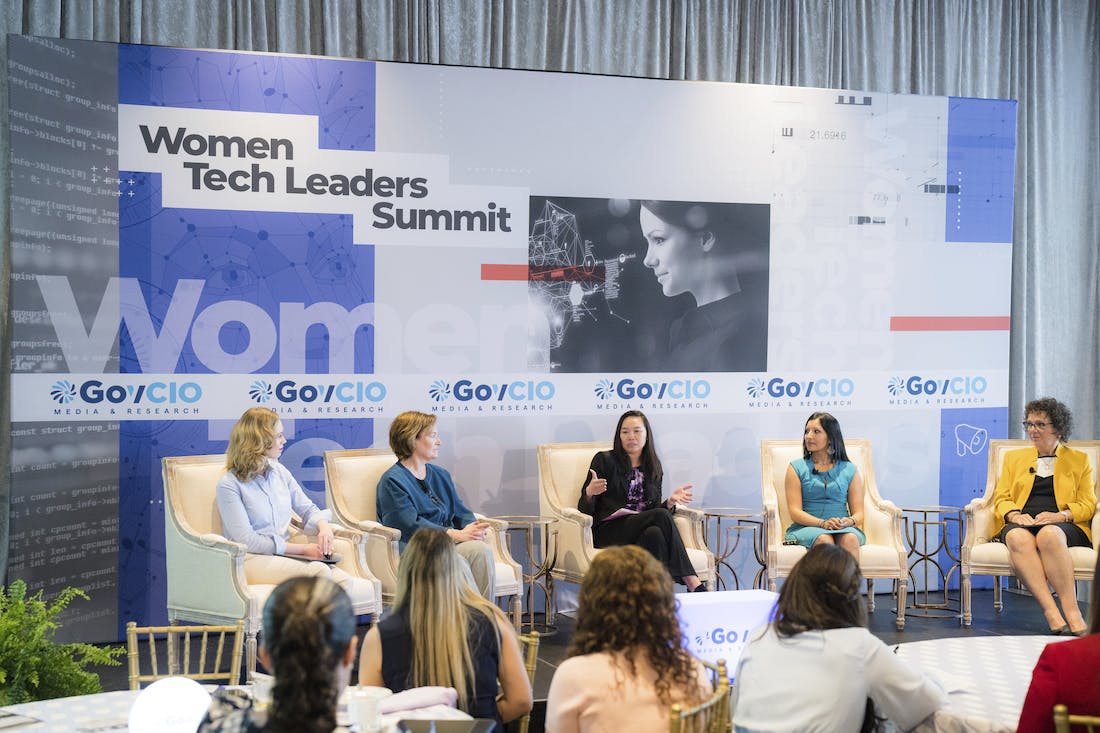Mentors Can Help Bridge Diversity Gaps in Federal Technology
Mentors Can Help Bridge Diversity Gaps in Federal Technology

In a male-dominated industry like technology, mentors can help provide women with necessary confidence and knowledge to combat a growing gender diversity gap.
Women technology leaders from the Defense Information Systems Agency (DISA), National Institutes of Health (NIH), Cybersecurity and Infrastructure Security Agency (CISA) and Maximus, all had a similar message on a panel at the April 13 Women Tech Leaders Summit: “Pay it forward.”
For decades, women have been underrepresented in the technology sector, and the number of women pursuing careers in technology are consistently low.
“As of 2023, women only hold 26% of the technology jobs,” said DISA Senior Technology Advisor Serena Chan at the summit.
Chan said there is a common myth that young girls and women don’t like science and technology. But “we see a lot of girls in the sciences; it’s usually out in the professional field where you start to see the dwindling numbers,” Chan explained.
And for those young girls and women who are interested in the industry, a strong relationship with a mentor can help them reach their goals.
“Looking at mentors is really important because you need a roadmap,” said Maximus Vice President Liz Anthony.
Unlike many career paths, the technology industry is not always a linear profession. Instead, women in the field are forced to make tough choices along the way. Women in tech say they rely on more than just one mentor.
“It’s important to build a network of mentors, not just in career, but in your social life, in anything that makes you, you,” said NIH Center for IT Acting Deputy Director Jothi Dugar. “I’m a single mom of three, I have a mentor for that. I am a woman in technology, and I have a mentor for that. So, I believe in building a strong network of mentors.”
But as Dugar said, attaining good mentors is only the first step. For mentees the mentorship should be a “two-way street.”
“It’s not all about what the mentor can do for you,” Dugar said. “So as a mentor, you can also learn from your mentee. And as a mentee, it’s also your responsibility to ask, ‘What are you looking for from that relationship from this particular mentor?’” Dugar said.
As women continue to make their footprint in the technology sector, male counterparts have a role to play.
“I don’t think we should gender stereotype who can be a good mentor,” said CISA Chief People Officer Elizabeth Kolmstetter. “But I also want to make a distinction between mentorship and sponsorship. Mentors are people who have already achieved something, a position or a place in the organization that you aspire to and can talk about their experiences. Sponsors are people who are advocating for you and looking for places for you to get that opportunity.”
The panelists agree that mentors prove to the next generation that anything is attainable, and in today’s tech landscape, mentorship is available now more than ever before.
“You can reach out virtually to anybody,” Kolmstetter said. “We’ve all seen that you can connect and have meaningful relationships with people you don’t meet in person.”
This is a carousel with manually rotating slides. Use Next and Previous buttons to navigate or jump to a slide with the slide dots
-

Trump's Education Nominee Calls for Tech Vocational Programs
Linda McMahon has called for investments in the tech workforce and small businesses to remain competitive.
3m read -

Storytelling Miniseries: Using Narratives to Nurture Relationships
In the final episode of our Storytelling Miniseries, we discuss building meaningful relationships through storytelling.
20m listen -

ODNI-UVA Partnership Develops Future Intelligence Workforce
The National Security Data and Policy Institute aims to bridge skills gaps and develop the intelligence community's next-gen workforce.
3m read -

RICE is a Key Ingredient of DOT’s IT Modernization
DOT's recently launched RICE platform streamlines application development to improve efficiency, security and public-facing services.
5m read








